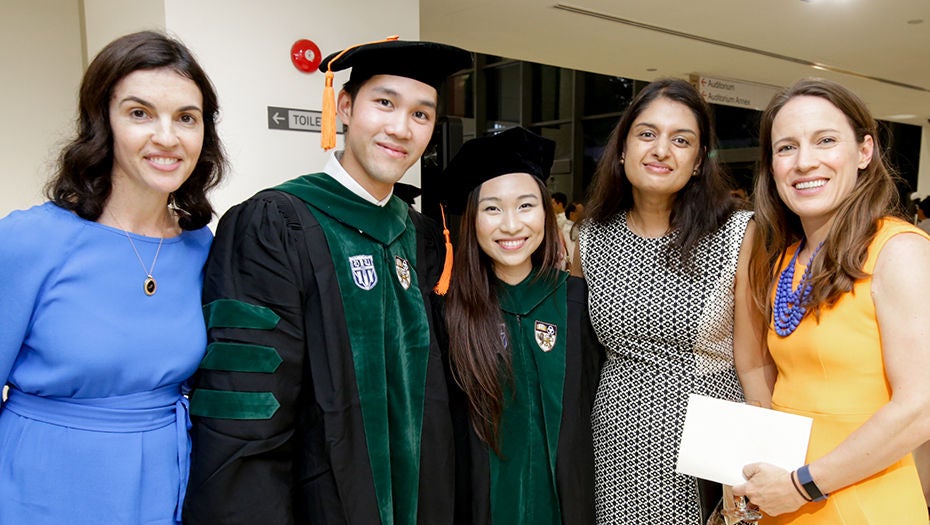
Dr Mara McAdams (far right), Associate Dean of Student Affairs & Alumni Relations at Duke-NUS, tells us about the importance of honing non-academic skills in doctors-to-be.
On the left wrist of Dr Mara McAdams is a unique bracelet with the words, “MOMMY”, threaded in orange and blue, the corporate colours of Duke-NUS Medical School. A gift from her daughter, who chose the colours knowing the bond the Associate Dean of Student Affairs & Alumni Relations has with the school. Dr McAdams may be the faculty member closest to the heartbeat of Duke-NUS, interacting regularly with students to understand their needs, be it academic, professional or personal.
As she works together with her team to build up a nurturing atmosphere to support a vibrant student life, she tells us how the school’s partnership with SingHealth has enriched the students’ growth and development, and shares on potential areas for further collaboration.
Can you tell us how important it is for a medical school like Duke-NUS to hone non-academic skills in our students?
“We are very focused on our Personal and Professional Development syllabus, as we aim to provide our students with a suite of skills that will enable them to be the best clinicians they can be. We live in a VUCA (volatile, uncertain, complex and ambiguous) world, and navigating their medical careers in this space demands skill sets such as self-awareness, emotional intelligence, self-directed learning and teamwork.
It is important to understand that our graduate students come from diverse backgrounds and are more mature than those from other (undergraduate) medical schools in Singapore. Most of our students have responsibilities outside of school, and yet they still choose to take up the challenge of a very compressed, rigorous and an intensive four-year curriculum.

What is special about them is that they bring the lessons, skills and knowledge gained in their ‘past lives’ into medical school and apply them to what they are learning here. I can attest to the merits of a ‘past life’ first-hand. As an undergraduate, I majored in History of Art and completed my pre-medical science work almost like a minor, which is not uncommon in US universities. Pursuing a liberal arts education before going into medicine helps people to think creatively, express their ideas well, and as they enter into medical school, knowledge of other disciplines – from art and literature to accounting and psychology – allows them to connect with the patients on a different level and see problems in healthcare in an innovative way.
How has student diversity enriched the Duke-NUS culture, and how has the school been nurturing them?
“As future healers, our students are altruistic even before they walk through our doors. They continue giving back alongside their studies – in the little time left after school and homework. We have a slew of student-led community initiatives such as Project DOVE, Camp Simba and I’m S.T.E.A.D.Y. lah! – all mooted and driven by students, with support and counsel from faculty.
I’m S.T.E.A.D.Y. lah!, for instance, is a student-organised community service project, aiming to contribute to the essential but challenging task of removing the stigma associated with mental health disorders. For the coming year, the student leaders chose to focus on increasing awareness within the School – among the staff, faculty and students. They will reinforce the need for people in the profession to first shake off that stigma, and we are glad to support their plans. We value students’ ideas like these, and we believe that providing a platform for them to take ownership of programmes and activities hones their leadership competencies and prepares them to contribute to their communities as doctors.
How has the SingHealth connection been helpful to shape students’ growth?
“Being linked to the largest national healthcare cluster in Singapore – SingHealth – our students have access to amazing clinical learning opportunities from distinguished faculty. They are also able to learn and participate in an impressive number of events and initiatives at the hospitals, especially at the Singapore General Hospital which is just across the road.
One telling example of the ways students work with SingHealth faculty is the new Disaster Volunteer Corps initiative. Students, working with Dr R. Ponampalam, Adjunct Assistant Professor, SingHealth Duke-NUS Emergency Medicine Academic Clinical Programme, imagined a new project that prepares students to support relief efforts in Singapore. This programme trains students not just in clinical knowledge but to effectively build capacity to deal with civil emergencies in Singapore. We anticipate that trained student volunteers will remain connected to SingHealth and constitute additional manpower for emergencies going forward.
In your view, what are some other areas of collaboration that Duke-NUS can explore further with SingHealth?
I believe we can to work better together to build up the resilience of our future clinicians. My colleague, Jennifer Davis, Director, Student Personal & Professional Leadership, and I train students to manage stress and improve coping through an emotional intelligence thread, and Professor Ian Curran, Vice-Dean, Office of Education at Duke-NUS hopes that we can further these efforts through partnering SingHealth colleagues. I have since been working with Associate Professor Ng Yee Sien, Senior Consultant, Department of Rehabilitation Medicine at Singapore General Hospital on the developmental needs of our students, and his input has enabled us to position our efforts within the local clinical context.
Considering the importance of preventing burnout across the education continuum – students, trainees and doctors – I wish to take this opportunity to shout out to colleagues at SingHealth who might like to collaborate to reach the shared goal of a workforce full of resilient and maximally effective doctors.













 Get it on Google Play
Get it on Google Play